Related Research Articles
Gaius Asinius Pollio was a Roman soldier, politician, orator, poet, playwright, literary critic and historian, whose lost contemporary history provided much of the material used by the historians Appian and Plutarch. Pollio was most famously a patron of Virgil and a friend of Horace and had poems dedicated to him by both men.
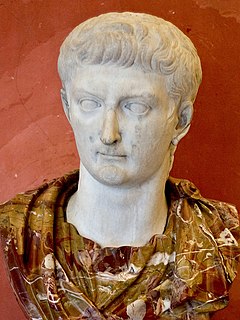
The gens Claudia, sometimes written Clodia, was one of the most prominent patrician houses at ancient Rome. The gens traced its origin to the earliest days of the Roman Republic. The first of the Claudii to obtain the consulship was Appius Claudius Sabinus Regillensis, in 495 BC, and from that time its members frequently held the highest offices of the state, both under the Republic and in imperial times.
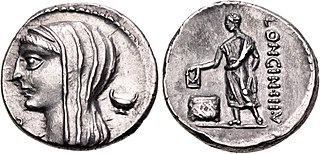
The gens Cassia was a Roman family of great antiquity. The earliest members of this gens appearing in history may have been patrician, but all those appearing in later times were plebeians. The first of the Cassii to obtain the consulship was Spurius Cassius Vecellinus, in 502 BC. He proposed the first agrarian law, for which he was charged with aspiring to make himself king, and put to death by the patrician nobility. The Cassii were amongst the most prominent families of the later Republic, and they frequently held high office, lasting well into imperial times. Among their namesakes are the Via Cassia, the road to Arretium, and the village of Cassianum Hirpinum, originally an estate belonging to one of this family in the country of the Hirpini.
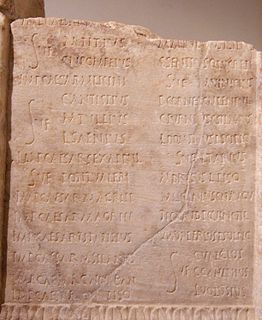
The gens Aemilia, originally written Aimilia, was one of the greatest patrician families at ancient Rome. The gens was of great antiquity, and claimed descent from Numa Pompilius, the second King of Rome. Its members held the highest offices of the state, from the early decades of the Republic to imperial times. The Aemilii were almost certainly one of the gentes maiores, the most important of the patrician families. Their name was associated with three major roads, an administrative region of Italy, and the Basilica Aemilia at Rome.
Decimus Junius Brutus Callaicus was a consul of the Roman Republic for the year 138 BC together with Publius Cornelius Scipio Nasica Serapio. He was an optimate politician and a military commander in Hispania and in Illyria. He was the son of Marcus Junius Brutus and brother of Marcus Junius Brutus. He had a son also named Decimus Junius Brutus and his grandson was Decimus Junius Brutus Albinus.

The gens Pompeia was a plebeian family at ancient Rome, first appearing in history during the second century BC, and frequently occupying the highest offices of the Roman state from then until imperial times. The first of the Pompeii to obtain the consulship was Quintus Pompeius in 141 BC, but by far the most illustrious of the gens was Gnaeus Pompeius, surnamed Magnus, a distinguished general under the dictator Sulla, who became a member of the First Triumvirate, together with Caesar and Crassus. After the death of Crassus, the rivalry between Caesar and Pompeius led to the Civil War, one of the defining events of the final years of the Roman Republic.
The gens Popillia, sometimes written Popilia, was a plebeian family at Rome. The first of the Popillii to obtain the consulship was Marcus Popillius Laenas in 359 BC, only eight years after the lex Licinia Sextia opened that magistracy to the plebeians.
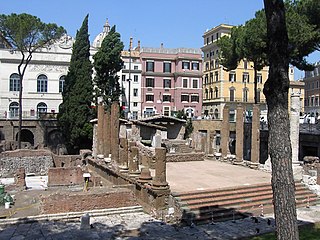
The gens Lutatia, occasionally written Luctatia, was a plebeian family of ancient Rome. The first of the gens to obtain the consulship was Gaius Lutatius Catulus in 242 BC, the final year of the First Punic War. Orosius mentions their burial place, the sepulchrum Lutatiorum, which lay beyond the Tiber.
Hortensia, daughter of consul and advocate Quintus Hortensius Hortalus, earned renown during the late Roman Republic as a skilled orator. She is best known for giving a speech in front of the members of the Second Triumvirate in 42 BC that resulted in the partial repeal of a tax on wealthy Roman women.
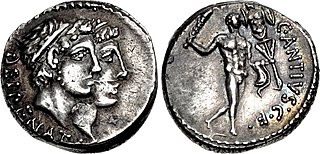
The gens Antia was a minor plebeian family at ancient Rome. The Antii emerged at the end of the second century BC, and were of little importance during the Republic, but they continued into the third century, obtaining the consulship in AD 94 and 105.
The gens Titia was a plebeian family at ancient Rome. The gens is rarely mentioned in the Republican period, and did not rise out of obscurity till a very late time. None of its members obtained the consulship under the Republic, and the first person of the name who held this office was Marcus Titius in BC 31.
The gens Sextia was a plebeian family at ancient Rome, from the time of the early Republic and continuing into imperial times. The most famous member of the gens was Lucius Sextius Lateranus, who as tribune of the plebs from 376 to 367 BC, prevented the election of the annual magistrates, until the passage of the lex Licinia Sextia, otherwise known as the "Licinian Rogations," in the latter year. This law, brought forward by Sextius and his colleague, Gaius Licinius Calvus, opened the consulship to the plebeians, and in the following year Sextius was elected the first plebeian consul. Despite the antiquity of the family, only one other member obtained the consulship during the time of the Republic. Their name occurs more often in the consular fasti under the Empire.
Tiberius Canutius or Cannutius was tribune of the plebs in 44 BC, the year of Caesar's assassination. As a supporter of the senatorial party, he opposed the triumvirs, resorting to military force during the Perusine War. He was captured and put to death by Octavianus in 40 BC.
The gens Domitia was a plebeian family at ancient Rome. The first of the gens to achieve prominence was Gnaeus Domitius Calvinus, consul in 332 BC. His son, Gnaeus Domitius Calvinus Maximus, was consul in 283, and the first plebeian censor. The family produced several distinguished generals, and towards the end of the Republic, the Domitii were looked upon as one of the most illustrious gentes.

The gens Juventia, occasionally written Jubentia, was an ancient plebeian family at Rome. After centuries of obscurity, the gens emerges into history with the appearance of Titus Juventius, a military tribune, in the beginning of the second century BC. The first of the Juventii to obtain the consulship was Marcus Juventius Thalna in 163 BC. But the family is renowned less for its statesmen than for its jurists, who flourished during the second century AD.
The gens Laelia was a plebeian family at Rome. The first of the gens to obtain the consulship was Gaius Laelius in 190 BC.
The gens Magia was a plebeian family at ancient Rome. Members of this gens are first mentioned at the time of the Second Punic War. Although several of them performed useful service to the Roman state, none of the Magii ever held the consulship.
The gens Mummia was a plebeian family at Rome. Members of this gens are first mentioned after the Second Punic War, and within a generation, Lucius Mummius Achaicus became the first of the family to obtain the consulship. Although they were never numerous, Mummii continued to fill the highest offices of the state through the third century AD.

The gens Munatia was a plebeian family at Rome. Members of this gens are first mentioned during the second century BC, but they did not obtain any of the higher offices of the Roman state until imperial times.
The gens Perperna, also found as Perpenna, was a plebeian family at ancient Rome. Members of this gens first appear in history during the second century BC, and Marcus Perperna obtained the consulship in 130 BC.
References
![]() This article incorporates text from a publication now in the public domain : Smith, William, ed. (1870). "Lepidus (10)". Dictionary of Greek and Roman Biography and Mythology . 2. p. 764.
This article incorporates text from a publication now in the public domain : Smith, William, ed. (1870). "Lepidus (10)". Dictionary of Greek and Roman Biography and Mythology . 2. p. 764.
- ↑ Velleius Paterculus, Roman Histories, II.10
- ↑ Valerius Maximus, Memorable Deeds and Sayings 8.1. damn. 7.
- ↑ Appian, Roman History Vol 6, The Spanish Wars 81-82
- ↑ Appian, Spanish Wars, 83
- ↑ Livy, Periochae, 56.1-2;
- ↑ Orosius, A History, against the Pagans, V.5
- ↑ Cicero, Brutus, 95-96
- ↑ Cicero, Tusculanae Disputationes , I.3
- ↑ Cicero, de Oratore, 1.9.40, ; Auctor, Rhetorica de Herennium IV.5.
- ↑ Cicero, Brutus, 97
- ↑ Priscian, Grammatici Opera, vol. I. p 456
- ↑ Meyer, Orator. 2nd. ed, Rom. Fragm., p. 193, &c. .